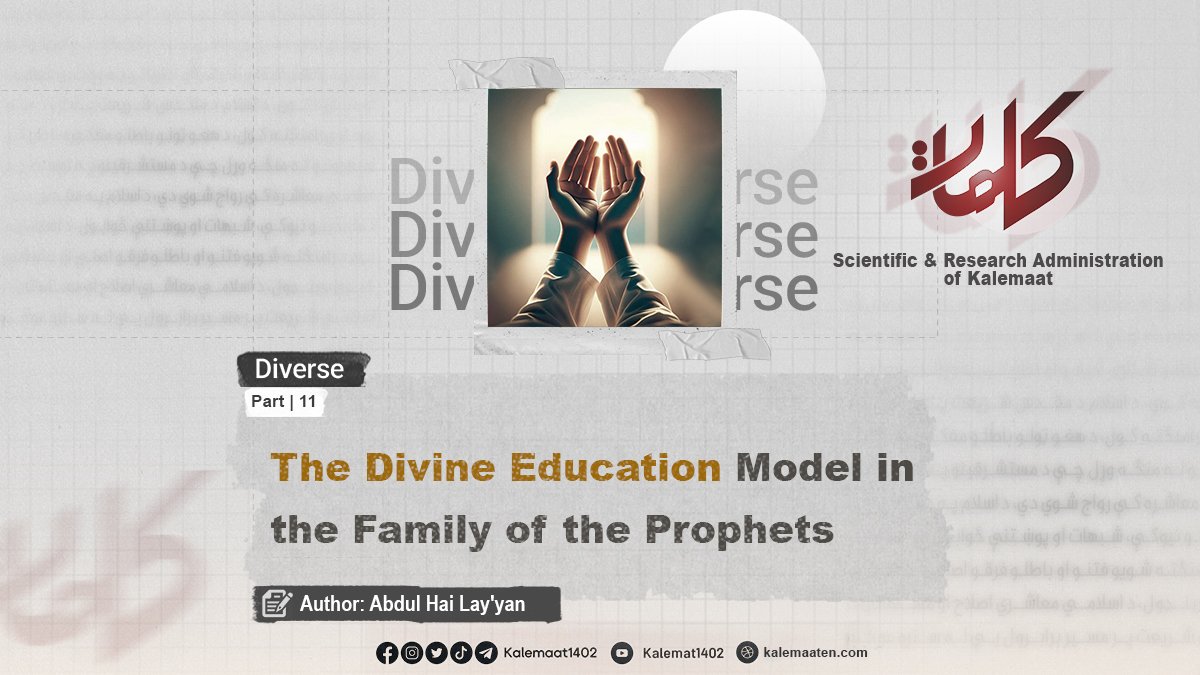Author: Abdul Hai Lay'yan
The Divine Education Model in the Family of the Prophets (Part 11)
Eighth Lesson: Strengthening the Bond Between Husband and Wife, Their Mutual Influence on Each Other, and the Reflection of This Relationship on the Family Structure
This is one of the foundational concepts in Islamic teachings. As the Holy Qur’an mentions in Surah al-Nisa, verse 1, and as the Prophetic Sunnah also clearly affirms, the creation of woman from the rib (side) of Adam is a symbol of the inseparable connection between man and woman. Islam views this relationship through a realistic lens and, by legislating the institution of marriage and emphasizing the formation of a family, transforms it into a positive and constructive bond. This divine religion considers marriage to be a firm and blessed covenant founded on mutual responsibility and commitment. Allah the Almighty says: “وَكَيْفَ تَأْخُذُونَهُ وَقَدْ أَفْضَى بَعْضُكُمْ إِلَى بَعْضٍ وَأَخَذْنَ مِنكُم مِّيثَاقاً غَلِيظاً” Translation: “And how can you take it back when you have intimately united with each other and they had taken from you a firm covenant?” [1]
Ninth Lesson: Understanding the Nature of Women and Bearing Some of Their Behaviors
The creation of woman from a curved side [as indicated by the Qur’an and the Sunnah] symbolizes her particular psychological and behavioral nature. Just as the rib is naturally bent and can only be straightened by breaking it, so too the nature of a woman may contain certain emotional or behavioral inclinations that the husband must bear with wisdom, within the divine framework of creation. Her role in the family—as a mother and household manager—is tied to this inherent trait and attempts to forcibly “correct” her may lead to the breakdown of the marital relationship.
Forgiveness Between Spouses: The Foundation of a Strong Family
The Holy Qur’an, considering the man as the manager of the household, guides him toward patience and forgiveness in the face of unpleasant behaviors from his wife. It reminds him that sometimes temporary dissatisfaction may conceal great good: “وَعَاشِرُوهُنَّ بِالْمَعْرُوفِ فَإِن كَرِهْتُمُوهُنَّ فَعَسَى أَن تَكْرَهُواْ شَيْئاً وَيَجْعَلَ اللّهُ فِيهِ خَيْراً كَثِيراً” Translation: “And live with them in kindness. For if you dislike them—perhaps you dislike something in which Allah has placed much good.” [2]
The Prophet Muhammad (peace be upon him) also emphasized this point: “A believing man should not hate a believing woman. If he dislikes one of her traits, he will be pleased with another.” [3]
Limits of Forgiveness: Between Inherent Traits and Legal Violations
This forgiveness applies to personality traits and behaviors that do not conflict with Islamic law. However, if a woman crosses legal boundaries—such as committing sin or abandoning obligatory duties—it is not permissible to ignore such behavior. In such cases, the husband is required to act with gentleness, wisdom, and good counsel to correct matters, without hastiness in making drastic decisions.
Tenth Lesson: The Danger of Listening to External Interference and Its Role in Destroying Family Life
When Adam and Hawwa (peace be upon them) listened to the whispers of Satan and responded positively to his deceit, the consequences were irreversible and led to their expulsion from the eternal blessings of Paradise. Therefore, family life must be protected with strong boundaries against any form of external interference. This strategy not only prevents the breakdown of the family unit but also creates a safe space for strengthening relationships based on Islamic principles. The Qur’an warns of this danger, stating that Satan is always lying in wait to weaken the foundation of families through division: “إِنَّمَا يُرِيدُ الشَّيْطَانُ أَن يُوقِعَ بَيْنَكُمُ الْعَدَاوَةَ وَالْبَغْضَاء” Translation: “Satan only wants to sow enmity and hatred among you.” [4]
Eleventh Lesson: Spouses Should Hasten to Make Amends for Their Mistakes
The Holy Qur’an refers to Adam’s repentance and acceptance of divine words: “فَتَلَقَّى آدَمُ مِن رَّبِّهِ كَلِمَاتٍ فَتَابَ عَلَيْهِ إِنَّهُ هُوَ التَّوَّابُ الرَّحِيمُ” Translation: “Then Adam received words from his Lord, and He accepted his repentance. Indeed, He is the Accepting of Repentance, the Merciful.” [5]
This verse invites couples to hasten in correcting their mistakes and to support one another in this journey. The mutual cooperation of husband and wife in rectifying errors and returning to God provides an opportunity for divine guidance and success. This self-initiated approach—founded on individual and shared responsibility—is far more effective and beneficial than others intervening to point out flaws or correct mistakes within the family. Self-reform and internal correction are the cornerstones for establishing a strong family life according to Islamic values.
Twelfth Lesson: Covering the Private Parts and Adornment as Part of Human Nature
Allah the Almighty says in the story of Adam and Hawwa: “وَطَفِقَا يَخْصِفَانِ عَلَيْهِمَا مِن وَرَقِ الْجَنَّةِ” Translation: “And they began to cover themselves with the leaves of Paradise.” [6]
This verse indicates that modesty and covering one’s private parts are innate to human nature, such that even in a situation of anxiety—like being expelled from Paradise—a sound-minded human being finds nakedness displeasing. Except in necessary cases, covering the body is a consistent principle in Islamic law. The Holy Qur’an explicitly states: “يَا بَنِي آدَمَ قَدْ أَنزَلْنَا عَلَيْكُمْ لِبَاساً يُوَارِي سَوْءَاتِكُمْ وَرِيشاً وَلِبَاسُ التَّقْوَىَ ذَلِكَ خَيْرٌ ذَلِكَ مِنْ آيَاتِ اللّهِ لَعَلَّهُمْ يَذَّكَّرُونَ” Translation: “O children of Adam! We have sent down to you clothing to cover your nakedness and for adornment, but the clothing of piety—that is best. That is one of the signs of Allah, so that they may remember.” [7]
Continues…
Previous Part/ Next Part
References:
[1] al-Nisa: 21
[2] al-Nisa: 19
[3] Sahih Muslim, Hadith 3633
[4] al-Ma’idah: 91
[5] al-Baqarah: 37
[6] al-A‘raf: 22
[7] al-A‘raf: 26



